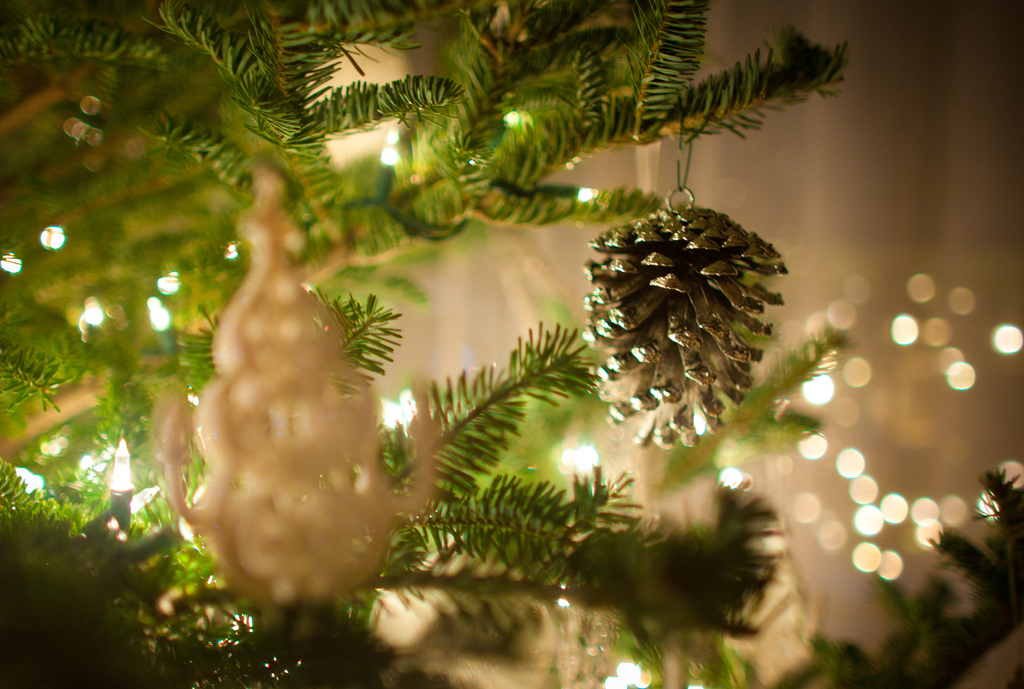
Decorated Christmas tree. Image: Aurimas, Flickr.
By Kaley Fech
Capital News Service
Michigan produces the third most Christmas trees in the nation and no state grows more varieties, according to tree experts.
“Any farm here in Michigan may produce eight to 10 different types of trees,” said Bert Cregg, an associate professor in Michigan State University’s Departments of Horticulture and Forestry.
That’s good for Michigan growers as more and more millennials opt for real Christmas trees, growers say.
“Young people that want to have that wholesome experience of looking for a tree are moving towards real Christmas trees,” said Amy Start, the executive director of the Michigan Christmas Tree Association based in Durand.
Tree farmer Mel Koelling also has noticed a growing number of younger people out on his Mason farm looking for that perfect tree.
Families are also a strong market for the cut-your-own tree business, said Koelling, who owns and operates Tannenbaum Farms with his wife, Laurie.
“It’s not unusual to see multiple generations of a family come out together. It’s become a family tradition to come and select a tree.”
Part of the allure of a real tree is the adventure that accompanies finding one.
“We have such fun out here on our choose-and-cut farm, with horse-drawn carriage rides, Santa Claus and a petting zoo,” said Dan Wahmhoff, president of Wahmhoff Farms Nursery in Van Buren County. “It’s really a family event.
“It’s a lot more fun than going to the store and picking out a plastic tree,” said Wahmhoff, whose farm in Gobles is west of Kalamazoo.
Finding that perfect tree can be a bonding experience for families, Koelling said.
“It’s a memorable event where you select a tree, you cut it, you take it home and you care for it,” he said.
Wahmhoff said the environmental friendliness of a real tree is also a selling point for younger people.
“The recyclability is one big thing for people today,” he said. “Real trees are recyclable, where people are learning their artificial trees will be in landfills for years.
“It’s not made from a petroleum product, it’s made from the earth,” he added.
And Koelling said Christmas trees are a renewable resource.
“You can plant them and cut them down and plant them, and you can do that over and over again,” he said.
Start said that for every tree that’s cut down, two or three new seedlings are planted.
The trees also produce oxygen, take in carbon dioxide, provide habitats for animals and provide beauty around the state, she said.
There are environmental trade-offs. The BBC recently reported that real trees decomposing in landfills produce greenhouse gases.
But there are also non-environmental benefits. Tree farms contribute to the local economy, Koelling said.
“They provide jobs, they’re a product made in Michigan and sold in Michigan, so the revenue stays in Michigan,” he said.
And Cregg, who researches Christmas trees, said millennials enjoy the opportunity to buy local.
“Most people probably aren’t more than 10 or 15 miles from a choose-and-cut farm,” he said.
According to the U.S. Department of Agriculture, the top 10 Christmas tree producing counties in the state are:
- Missaukee
- Wexford
- Oceana
- Montcalm
- Allegan
- Van Buren
- Manistee
- Osceola
- Kalkaska
- Antrim and Newaygo
Fraser firs are the most popular choice for Christmas trees.
“There are lots of things to like about Fraser firs,” Cregg said. “They have excellent needle retention so they’ll keep their needles up to six weeks, they have excellent color and an elegant sort of appearance.”
They’re also more demanding in terms of the types of conditions they grow under.
“A Fraser is a little bit of a primadonna,” he said.
Fraser firs typically cost between $8 and $10 a foot, Start said. The most popular trees are between 6 and 7 feet tall.
Balsam, Douglas and Canaan firs, Scotch pines and blue spruces are also popular, Start said.
According to the U.S. Department of Agriculture, the top five tree species grown in Michigan, by acre, are:
- Fraser firs – 7,500
- Douglas firs – 4,450
- Scotch pines – 4,350
- Colorado blue spruce – 2,900
- Balsam firs – 1,300
Michigan has approximately 27,000 acres in Christmas tree production, and roughly two million trees are harvested each year, Start said. The annual net value is more than $27 million.
Koelling said one of the most satisfying things about owning a Christmas tree farm is knowing that the product he produces will end up at the center of people’s Christmas celebrations.
“Natural Christmas trees require effort,” he said. “But I think there’s an increasing commitment to say, let’s not just be totally convenient and get the tree out of the box. I think there’s a growing perspective that some things that are valuable require effort.”
To find a retail lot or choose-and-cut tree farm near you, visit the Michigan Christmas Tree Association at https://www.mcta.org/.